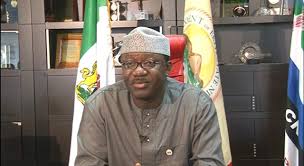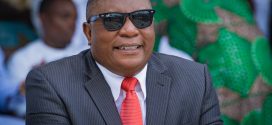By Femi Odere
Since what one thinks about himself and/or his activity either in general terms or in any given circumstance can be misleading, diametrically opposed, if not worlds apart from what others think also either in general terms or in a given situation, I did not realise that what I honestly think has been my modest involvement in articulating and interrogating not only the political trajectory and the philosophical imperatives that underlies his various accomplishments and approach to governance, but also the very essence of Dr. John Kayode Fayemi is also what others see as bordering on the realm of fanaticism. No sooner that the votes of Saturday, July 14, 2018 Ekiti State started to trickle into the public space in bits and pieces than I was bombarded with calls, e-mails and WhatsApp messages from known friends and acquittances, as well as inquiries by way of emails and other social media platforms from people across the world, some of whom I have never met, who wanted to find out from me what Fayemi’s chances were in winning the governorship election. My short response to all these inquiries was my simple 3-word statement that “Fayemi will win” and that there was nothing to worry about. I would then share the results from the polling units I had at my disposal, some of which some of them equally had at their disposal from various sources.
While I was happy that an election that generated such intense heat both from within the House of the Progressives and between parties—-which may have left some people on both sides of the political divide with bruises, some of which may turn into permanent scars—-had finally arrived, the fun of responding to all these inquiries and sharing with people whatever election results were sent to my phone device from Fayemi’s “Situation Room” eventually turned somewhat irritating. Why? It’s because despite my assurance to these concerned well-wishers that—-head or tail—-the then APC candidate was going to win the election, they wouldn’t leave me alone as the calls just wouldn’t stop even at the wee hours of the following morning. At this time, I thought I would have been left alone to have a good sleep in readiness for the next day’s victory dance as my faith has never been so strong that Fayemi was going to coast to victory at the end of the electoral exercise. Some people, including those who should have known better, were apparently apprehensive about the fake news flying around on Facebook and other social media platforms that the candidate was losing that they wanted my earlier assurance to be reinforced. I had to ask a friend in North America who interrupted my sleep with his call if he thought I was either at the collation centre of the Independent National Electoral Commission (INEC) or with the APC candidate in his bedroom when he demanded a prognosis of the election. His reply, which we both laughed over, although instructive, was that he would be amazed—-considering what he called my “consistently snipping or ‘shooting’ at the candidate’s political enemies” for so long—-if I was not in the candidate’s bedroom at the time. As if to tell me, indirectly, that he has been ‘stalking’ my written words, links to a couple of articles I wrote as far back as 2014 on Ekiti politics vis-à-vis Dr. Fayemi soon appeared on my phone screen. With this exchange, and several other inquiries from people who thought of me as their resource person at that critical time, I didn’t need to be persuaded that how one perceives himself is not as important as how he is perceived by others.
A similar perception also played itself out in the aftermath of the governorship election when I decided to touch bases with friends and colleagues in some media houses to reconnect as well as take stock of the Ekiti election. Not a few expressed the refrain that I must have been in every brainstorming sessions at critical junctures of the campaign because of what they referred to as the “intensity and forcefulness” of my interventions on behalf of, or on issues that had to do with the APC candidate, which I answered in the negative. Since I recognized the fact that their statement also had a second part—-which was unstated as it was left for me to decode the other part from their choice of words—-I also had to intimate them with the fact that I didn’t have to get any clearance for my intercessions and that the then APC candidate reads me on the pages of the newspapers just like them—-and everyone else.
Since Dr. Fayemi has demonstrated beyond a shadow of doubt—-and at each turn in his political/leadership trajectory—-that he is not a fly-by-night player in the country’s political theatre but one who has evolved into a concept (but steadily inching his way into a belief system), it then becomes necessary, if not a requirement by keen observers of politics and public analysts that each new chapter in what’s now a truly ordained political adventure must be copiously interrogated so that history may not sleep when it matters most. But before that, it is meet that history must be reminded, once again, that a chief of state, who had to run out of town in his first outing because of several malfeasances and unprecedented criminal acts, including murder and mayhem came to finish off the job in his second coming that a relatively small, unique and peaceful geographical entity fondly referred to as the “Fountain of Knowledge” has not only been turned into a serious basket case, but also a pigsty where every socio-economic indices and infrastructures that had launched the state into an enviable growth path during Fayemi’s first outing are either virtually non-existent or are now shadows of themselves. What is more, the current governor is leaving a whopping, verifiable N90 billion external loans behind (which is likely to increase after his successor takes his seat) in a state in which its tax base is negligible and the loans were not invested to spur economic activities. Nothing can be more criminal than Ayo Fayose’s stewardship of the state and its people. The coming Fayemi government may well turn out to be a microcosm of the Buhari administration in which he—-and everyone—-knew that things were bad but didn’t quite know the extent of the damage caused by Jonathan until the president took his seat.
While it can be said that the state is second time lucky with Fayemi’s victory at the poll because he was the architect that conceived, laid the foundation and erected the socio-economic structure up to the lintel level in his first outing because of his demonstrable transformational leadership, strategic visioning, selfless patriotism and sacrificial service among others, it must also be emphasized that governance this time around is bound to be more challenging not because the Governor-elect has lost the development blueprint with which Ekiti State embarked on the growth path in his first outing, but because he must backpedal to 2010 as opposed to 2014 when he left office for another round of heavy-lifting for a sustainable development of the state.
As if this task to backpedal, which has been criminally and intentionally forced on the state by Fayose will not be daunting enough, there are new variables that were absent in the first outing of the Governor-elect that he must now contend with. For instance, even though he has the constitutional mandate of four years in which the state’s misfortune must be turned around (he will effectively become a lame duck almost from Day One after his swearing-in because he can no longer run for a second term), the Governor-elect must effect a strategic leadership succession plan also almost from Day One after his inauguration with a cadre of core loyalists who would have been highly trained in the arts and crafts of governance by the end of his term that he must necessarily leave behind for his successor for the twin purposes of effective guidance and sustaining the legacy within the carefully laid out growth path into the foreseeable future. While being a lame duck will also present its own unique challenge in the sense that maintaining fidelity to Fayemi’s strategic visioning may not be as water-tight, as there will be distractions due to the inevitable succession struggle and other strategic repositioning by some important political appointees and other power centres in the state, this can be temperated by his insistence in having round pegs in round holes from the state’s power centres who must ‘donate’ personnel to his administration. It is also important to state here that there are still some haters among the major stakeholders not because the Governor-elect has been found wanting in character or leadership ability and capacity—-judging by his track record, which was brought home in a rave review by President Muhammadu Buhari during a valedictory session in his honour at the Federal Executive Council (FEC)—-but because Fayemi’s concept of leadership and governance style still appears somewhat less endearing and therefore misunderstood. This is where effective communication that should consistently percolate through the MDAs of government and the general public comes in. Equally important is also next year’s presidential election in which the Governor-elect will be a key component in Buhari’s re-election not only in his state but in the Southwest geo-political region where the final outcome of the presidential election will probably be decided.
While it is one thing for a barbaric megalomaniac to have turned Ekiti State into his fiefdom where no opinions or ideas as to how a society should grow that are contrary to that of Emperor Fayose may be expressed without serious consequences, it is another thing altogether to have placed character deficient, chronically inexperienced, educationally challenged and intellectually vacuous (which are the key ingredients necessary for building a just and sustainable society) personalities in all the critical levers of government up to the legislative branch. One will be stating the obvious that the incoming administration will need all the help it can get. Therefore, a good starting point in turning around a state that has been badly violated and vandalised will be in having good and quality hands on the developmental plough so that the administration is not bogged down by personnel who hardly understand the grand vision, let alone articulate it in the coming Fayemi government.
Femi Odere is a media practitioner. He can be reached at [email protected]
 Hottestgistnaija.com
Hottestgistnaija.com




